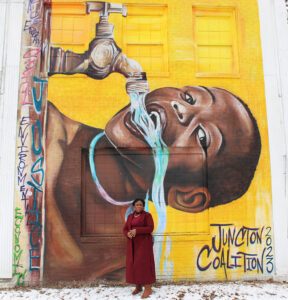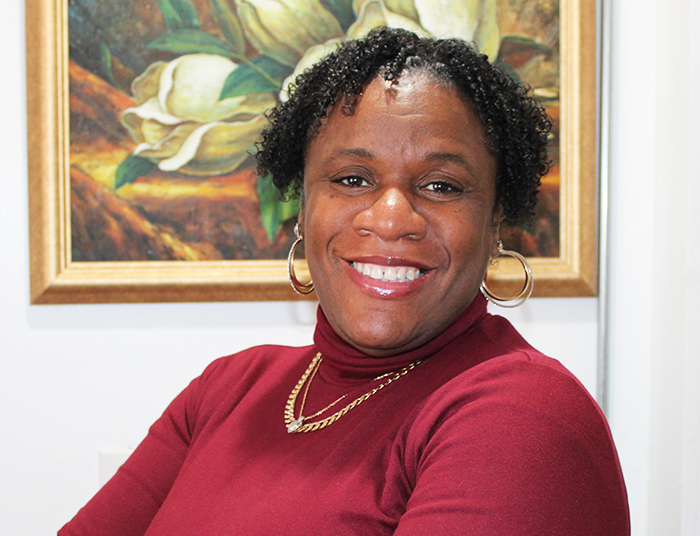 By Asia Nail
By Asia Nail
The Truth Reporter
Some leaders are chosen. Others rise from the heart of the struggle, molded by the needs of their community and driven by a purpose greater than themselves. Alicia Smith is the latter. As the executive director—and proud community liaison—of the Junction Coalition, she has spent over a decade ensuring that the Junction neighborhood is not just surviving but thriving. Now, as the YWCA Milestones 2025 Honoree for Social Services, she is being recognized for her unwavering dedication to social justice and peace education—work that has reshaped not only the Junction neighborhood but the city itself.
A Mission Rooted in Community
Smith’s journey is deeply personal. “What keeps me motivated is my family. I have three beautiful children, two boys and a girl, and a grandbaby,” she shares. Raised in Toledo with strong ties to her grandmother, she was instilled with the values of service, care and advocacy at an early age.
“Grandma taught me to take care of the elders in our community and how to work with young people,” Smith recalls. “She taught by example, working as a bus driver for Toledo Public Schools.” That legacy of care and responsibility laid the foundation for Smith’s work, shaping her leadership philosophy as one of collaboration rather than command.
A Community Liaison, Not a Director
For Smith, the title of “community liaison” is intentional. “Directors direct. They point, and people go. I struggle with this title because we don’t need unilateral leadership anymore; we need collective practice,” she explains.
“A community liaison works for and with the community. They move to the sound of the community. They ask for permission, respectfully. They carry out plans and report back the results.”
Smith believes that leadership is a shared journey, one where collaboration fosters real change.
Four Pillars of Justice
At the heart of the Junction Coalition’s work are four pillars: Social Justice, Economic Justice, Environmental Justice and Peace Education. These are not abstract ideals—they are the blueprint for tangible change.
One defining moment came when Smith was sitting in a doctoral-level human rights course taught by Dale Snauwaert, PhD, at the University of Toledo. “He was speaking about peace, education, economic, and environmental rights. He was focused on sustainability, and I reflected on the Junction area where I live—it didn’t have a voice. I wondered, ‘Why am I only now learning many of these truths only at the doctorate level? Why don’t my neighbors know that we live in hazardous environments?’”
From that realization, Smith took action. She attended environmental conferences, learned how to effect change on a local level, and spearheaded initiatives addressing water safety, urban heat islands and air quality.
Her work has led to critical programs like the 419 Lead Out initiative focusing on lead abatement and education, working to eliminate lead contamination in homes and create safer living conditions for families. Through safe and affordable water initiatives, she has championed efforts to improve water quality, access and affordability, advocating for sustainable solutions that prevent water crises in marginalized communities. Additionally, the Reimagining Swan Creek project seeks to revitalize the area by enhancing green spaces and fostering economic development while transforming the creek into a resource benefiting both residents and the local ecosystem.
Empowering Youth
Smith’s advocacy extends beyond immediate community needs—it builds a future where young people have the tools to lead. The Urban Narrative Expression Podcast is one of those tools.
“The podcast gives our youth a voice, but more importantly, it teaches them how to use their voice,” she explains.
Through the platform, youth discuss critical topics like bullying, racism, and systemic barriers. “We all need to be able to talk, to have public deliberation around the things that are harming us. At the Junction Coalition, we ask our youth: Where does it hurt? We don’t just ask to offload, we ask so we can build the resources to support them.”
Alicia’s son, inspired by her work, started a nonprofit at a young age. “When Trayvon Martin was murdered, my son came to me and said, ‘Mom, I want teens and young people to be able to talk to each other about how we feel seeing this on television.’” That moment reinforced Smith’s belief in the power of restorative justice, leading her to become a certified restorative justice practitioner, working within the juvenile court system and beyond.
Turning Voices into Action
“The greatest success we’ve seen in the Junction area is people coming out and vocalizing what they want to see,” Smith reflects. “Then we take those community voices and we’ve turned them into local, state, and federal investments.”
These investments are visible—homes being built, businesses receiving support, and youth programs expanding. “We have gone from speaking something, to implementation, to now seeing it take place,” she says with pride.
A Recognition That Amplifies
Being honored by the YWCA as a Milestones 2025 Honoree is not just an accolade for Smith; it is a moment of collective recognition for the entire Junction community. “The recognition means our work is not in vain. It means when we take the time to learn from one another and show our greatness openly—we can move mountains.”
Alicia Smith’s work is history in the making—both Black history and Women’s history intertwined. She stands in the lineage of Black women who have built communities, uplifted voices, and demanded justice. She is proof that when a community stands together, change is not only possible—it is inevitable.
And for the Junction neighborhood, this is just the beginning.
Congratulations to Alicia Smith on this well-deserved honor! Learn more about the YWCA Milestones Awards here.

